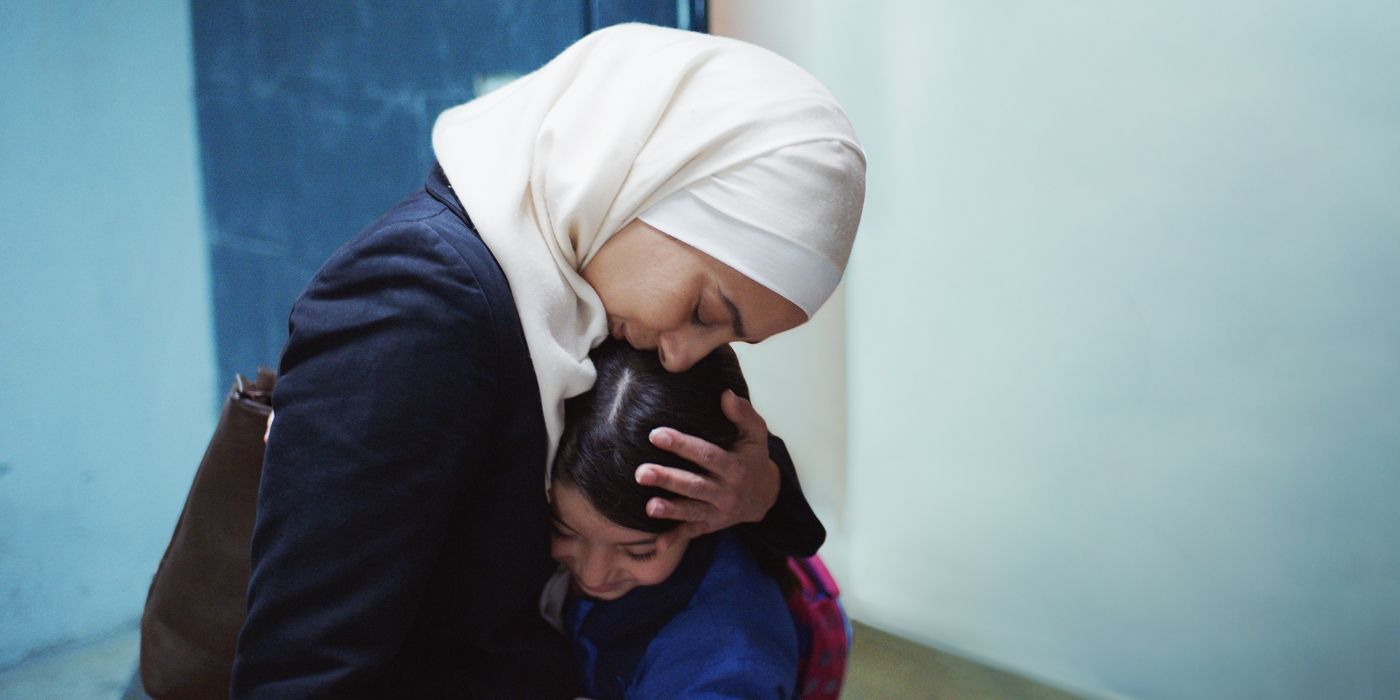Inshallah a Boy is the subtle yet deeply affecting feature-length directorial debut from Jordanian filmmaker Amjad Al Rasheed. This drama — which is Jordan’s submission for the Academy Awards — follows Nawal, a mother whose husband dies suddenly one night, leaving her unmoored in a society dependent on husbands and fathers. Al Rasheed co-wrote the screenplay with Delphine Agut and Rula Nasser over the course of five years or so, and this meticulous editing paid off. It’s clear that a great degree of care has gone into this story, which plays out steadily over the movie’s 113-minute runtime.
So many elements of this project are impressive, from its elegant construction to the effortless conveyance of its ideas, it’s smooth all the way through. This is not to say it’s always an easy watch, several moments are far from it, but it’s never forced or overly expositional. Our central character, Nawal, is played by the phenomenal Palestinian actor Mouna Hawa, and she is captivating on-screen. Al Rasheed and the cast and crew have crafted a powerful portrait of a stubborn, resistant, caring woman layered with feminist throughlines and humor.
An Expert Bait and Switch
When Nawal’s husband, Adnan (Mohammad Ghassan), passes away, she is immediately surrounded by her community who visit her and her daughter (Seleena Rababah), bringing them food and comfort. These few scenes are heartening, and serve as a great promotion for this form of structured grieving that is uncommon outside of religious communities. However, despite these warm-seeming moments and gestures, things quickly take a turn. Nawal’s brother-in-law, Rifqi (Hitham Omari), starts to drop not-so-subtle hints that Adnan owed him money for a pickup truck. This swiftly escalates to Rifqi declaring that, due to inheritance laws, he will soon own Nawal’s home and force her out, taking her daughter from her at the same time.
Under any circumstances, this would be devastating, but it is especially difficult to grapple with because Nawal and Adnan both paid for their home, but she doesn’t have the paperwork to prove her claims. Soon after, Nawal believes she has received a sign that she’s pregnant and decides to put her faith in this idea, because if she has a boy then he would inherit Adnan’s property instead of Rifqi and save her from being evicted from her home.
The way that Inshallah a Boy builds this sense of warmth and security around Nawal after Adnan’s death only to so swiftly create a more hostile environment allows the audience to experience the same shock as Nawal. Of course, the emotion conveyed to the viewer is only a fraction of Nawal’s reality, but even a small portion of this feeling is a heavy weight. The insistent way that Rifqi hounds Nawal first for the pickup money and later for her home is sickening. It’s hard to comprehend the scale of his obliviousness toward Nawal’s grief, and this goes to show the lack of care given to the tangible, legal hardships that Nawal and other women in Jordan face.
Dextrous, Nuanced Feminist Ideas
Greenwich Entertainment
In that vein, the feminist strands of Inshallah a Boy are sturdy. Not only is Nawal’s legal situation distressing to watch but there is another woman, Lauren (Yumna Marwan), who has an unwanted pregnancy. She tells Nawal that she doesn’t have a maternal instinct and doesn’t want her baby because her husband is a cheater. While, at first, Nawal tries to convince her that the baby is a blessing and that she will learn to feel tenderness toward her child, she eventually sees Lauren’s point of view. In this way, the movie is able to cover differing feminist perspectives on similar issues, without prioritizing one or the other.
Related: The Best International Movies of 2023
Lauren’s unwanted pregnancy also opens up avenues for discussion about the role of women in upholding patriarchal structures of oppression. Her mother, a wealthy woman who employs Nawal to care for her own aging mother, lives a life of luxury. She seemingly doesn’t work, in or out of the home, and spends her days relaxing with cucumber slices over her eyes. When she finds out about Lauren’s actions, she reports them to Lauren’s husband, and the consequences are violent and ugly. It may seem nonsensical for a woman to throw her own daughter to the wolves like that, but when you are one of the few who benefits from the subjugation of the rest, it’s in your best interest to feed back into the cycle. This sequence does a striking job of conveying how and why members of oppressed groups sometimes choose to lean in rather than resist.
Greenwich Entertainment
Returning to Nawal, she responds in horror at Lauren’s mother’s actions, telling her that she is responsible for her daughter’s beaten state. Here, it’s interesting how Nawal jumps straight to blaming Lauren’s mother, rather than her husband. While it’s true that if Lauren’s mother hadn’t told him, he may not have found out, it’s also true that he is ultimately the one to blame for beating her.
The decision to have Nawal fire the blame in the direction of another woman does two things. Primarily, it puts on display the knee-jerk impulse to blame women for the actions of men. But, it also removes the men from the story. It suggests that the men in these women’s lives are in a different category and that, in a strange way, they have no agency, painting them as one-dimensional background characters. Lauren’s mother could have chosen not to tell the husband, but in the eyes of these women, the husband only had one path he could have taken.
Related: All 15 International Movies Nominated for Best Picture, Ranked by Rotten Tomatoes
The movie as a whole, but these scenes about reproductive rights, in particular, present some of the most nuanced, interesting, and non-prescriptive feminist thinking to be put to the screen in recent years. It’s not attempting to convince you of anything, it’s simply portraying three starkly different women with different approaches to the society in which they live.
A Little Touch of Levity
Greenwich Entertainment
Inshallah a Boy could easily have been dreary and plodding with its heavy subject matter. However, thanks to the aforementioned impeccable pacing and some gentle humor, the movie is given dimension. Fortunately, it never makes a joke out of Nawal or Lauren’s situations, which would have created a dissonance in the tone, but it does find moments of levity in everyday situations now and then. Nawal’s daughter is young and very sweet, and she provides some of the lightness in question. You can see Nawal soften when she interacts with her, and it’s impossible not to follow suit. Their mother-daughter relationship is lovely to watch, with both actors playing it convincingly.
Without spoiling it, the best incorporation of humor comes from the closing scene, and this lands the movie’s final, optimistic punch. The way that what we see on-screen conveys such a triumphant feeling despite the reality being far from it, is a perfect culmination of this sweet, complex, and ultimately uplifting story. From Greenwich Entertainment, Inshallah a Boy will be released in theaters on January 12th, and will be available on Prime Video and Apple TV+ on March 12th.
You can view the original article HERE.






























